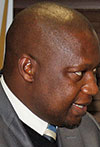
Anyone who thought that any of the international board certifications, accredited qualifications, South African diplomas, degrees, masters, or even doctorates in security and risk management would be a reasonable expectation of registration with the security regulator in South Africa can think again. First, you must ensure that you have brushed your teeth and washed behind your ears as the first stage of completing the ‘Grade’ training for registration with the regulatory authority, PSiRA.
In recent months, PSiRA has announced its application to SAQA for status as the professional body for the industry, when one of the things it consistently refuses to do is recognise the professionals within it, and much the same can be said for the Quality Council for Trades and Occupations (QCTO) and the Safety and Security Sector Education and Training Authority (SAASETA) who preside over security training and funding streams with virtually no knowledge, skills or experience within the industry.

These are just a few of many concerns that Dave Dodge, chairman of the South African Institute of Security (SAIS) raised with the regulatory authority at many public and private forums in recent years, but to no avail. Until last month, when his persistence paid off the PSiRA CEO, Manabela (Sam) Chauke and high-ranking PSiRA staff, including former Hawks General Israel Kgamanyane the newly appointed Deputy Director of Law Enforcement, met with security professionals from many sectors of the industry to discuss a whole host of topics in the first consultation exercise of its kind.

Creating an inclusive industry
SAIS is a non-profit company representing security professionals within South Africa, many of whom possess immense experience and formal qualifications across a variety of security disciplines. SAIS promotes further education, career development and life-long continued professional development for those within the industry and is particularly keen to assist and encourage youth and women security professionals starting out in their chosen career.
In recent years, most of these highly-qualified professionals have been employed as security and risk managers for private and state-owned companies and so are consumers of the many private security services offered by service providers across the country. However, together with the public, they have been largely ignored by the regulator during its consultation processes, which have focused upon its registered security service providers such as guarding companies and the like – raising an interesting point as to whether leading retailers and other service providers would have survived if they hadn’t ever listened to their customers?
The planned hour-long session lasted for almost two hours as Chauke and his staff engaged with the large number of professionals present and discussed a variety of topics, including many which had not previously been tabled during consultation meetings and would need further investigation and consultation before definitive responses could be confirmed. In one case, Chauke acknowledged the complexity of the problem and responded by telling the audience “that is a difficult question, but as CEO I am accountable and responsible so I will answer as best as I am able with the information that is currently at my disposal” – no doubt a question that will be followed-up at the next session!
A positive start
Overall, the session was heralded as a great success by those attending and Chauke committed to it being the start of a long-overdue consultation process across the broader spectrum of the security industry. The follow-up consultation in Johannesburg is being scheduled to take place with Chauke in early November, the details of which will be circulated once the availability of Chauke and other key participants has been confirmed. Thereafter, strenuous efforts will be made to hold further sessions in other provinces starting in the new year.
Topics already under consideration for the next session include:
• The role of PSiRA in identifying non-compliance with firearms legislation by security service providers.
• How PSiRA plans to professionalise a professional body.
• Mapping customer requirements to the proposed security training regulations.
If you would like to be kept informed of future PSiRA industry consultation sessions, other SAIS events, or would just like to have your concerns raised with Chauke on your behalf, please send your details by an email to the SAIS Administrator, John Baker, at [email protected], or SAIS Chairman, Dave Dodge, at [email protected]
© Technews Publishing (Pty) Ltd. | All Rights Reserved.